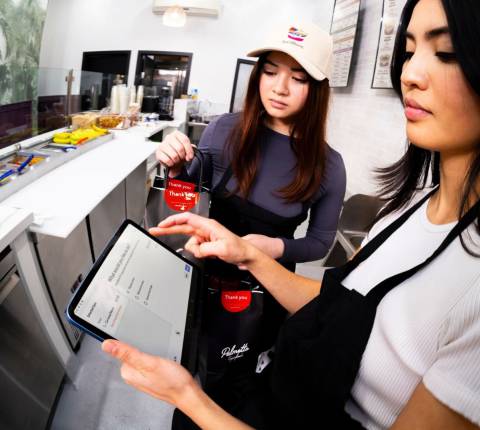Around the world, today’s labor shortages have left restaurant owners competing for top talent like never before. 85% of restaurant owners say they’ve had trouble finding staff, and many have raised wages in an attempt to attract new talent.
Beyond offering an increase in pay and benefits, there are a few things restaurant owners can do to find and retain staff. By optimizing your hiring strategies and developing a strong team culture, you can keep turnover low and morale high—powerfully boosting your bottom line.
Here are five tips for hiring restaurant employees and maintaining a company culture that's built to last.
1. Expand your hiring horizons
When it comes to hiring restaurant workers, how you get the word out about your open roles is key. To fill administrative staff and management roles, consider sourcing candidates through traditional career platforms like LinkedIn, Indeed, and Glassdoor. When looking for culinary talent, post job openings on industry-specific career pages such as Poached Jobs, Culinary Agents, Restaurant Careers, and Good Food Jobs.
But don’t stop there. Plenty of people pass by your restaurant each day, and one of them might be your next general manager, star bartender, or another talented restaurant employee whose presence changes everything. Take advantage of foot traffic by putting up an eye-catching “We're hiring” sign.
Other restaurant recruiting strategies include posting on social media or hosting an open call for talent. If your restaurant has a track record attracting student employees, consider hosting a booth at the local high school or college job fair.
Here, friends get to work side by side at Playa Bowls, Atlanta.
Additionally, consider opening up your hiring pool to frequent patrons of your restaurant, as well as friends of employees. Implementing an employee referral program can pay off. As Rick Badgley, EVP of Chief People & Administrative Officer at Brinker International, said during DoorDash’s 2021 Main Street Strong Conference, “We have found that referrals are three times more likely to stay, and their engagement is twice that of somebody who was not referred into the organization.”

Make sure you're investing the time to listen to your team members. They have invaluable feedback for you.
2. Write mouth-watering job descriptions
To recruit employees for restaurants, write job descriptions that grab the right kind of attention.
Yes, you should include concrete details to give candidates a firm grasp of the role—that’s a non-negotiable. But storytelling is the secret sauce that will make potential new hires hungry for more. Share your mission and values so candidates understand what working at your restaurant is really about. Tell job seekers who you are, what you do, and why you do it—don’t be afraid to get to the heart and soul of your business. It’s those unexpected elements that connect with candidates on a more personal level.
For inspiration, consider this sample blurb: Susie's Diner isn't just a breakfast spot. To our customers, we're a home away from home. We provide hardy helpings of comfort food, just how mom used to make it. If you're looking to join a team that's more like a family, this job is right for you.
Similarly, Maggie Dango, a General Manager at RoyAl’s Chicken and Burgers in western Australia, explains how the restaurant’s culture convinced her to work there. “I loved it from day one as a customer. I could feel how RoyAl’s culture was so welcoming and unpretentious,” she says.
The takeaway? Missions matter—so make them top of mind.
Here, Sweet Evelyn Cafe in Melbourne uses a “We’re hiring” post to attract talent through Instagram.
3. Identify winning skills
If you're wondering how to hire restaurant staff, interviewing is an essential part of the process. Don't evaluate candidates on experience alone—soft skills like communication, conflict resolution, and teamwork are also key ingredients for success in the restaurant business.
Whether entry-level or experienced, a restaurant employee needs soft skills to handle difficult situations that are inevitable in the industry, such as the ability to stay calm under stress and work well with different customer personalities. Other soft skills include leadership, adaptability, proactiveness, and problem-solving. A sense of humor never hurts, either!
To identify soft skills in a short interview, develop a list of targeted hypothetical questions. For instance, here are some questions you might ask to assess a candidate’s soft skills:
How would you approach a busy shift when the kitchen is out of a best-selling ingredient?
How would you deal with a customer who says they received the wrong order?
Tell me about your favorite time working with a team. What did that look like, and what did you work on together?
Once you identify a candidate with winning skills, it's important to hire fast. “The data suggests that an hourly team member applying to your restaurant is a perishable commodity. They’re on the market for three days,” explains Badgley.
For more ideas, check out this help guide from Monster on how to identify soft skills in interviews.
Employees are made to feel like family at the popular west coast seafood chain, Pacific Catch.
4. Build a culture-driven company
Studies show that only 35% of US workers are actively engaged on the job, and only 21% report feeling strongly valued at work. One of the best ways to recruit staff is to build a positive company culture—one where employees will feel like they're part of a bigger picture and a supportive team.

You can’t afford not to create a sense of belonging from the moment [candidates] interview—the moment they walk in your door for the first time.
To build a strong company culture, you'll want to do a few things:
Share your core values from the start. When interviewing candidates, be transparent about the type of establishment you are. Your staff needs to know what you value most. Make a new hire's first few weeks exceptional by providing a supportive onboarding process that showcases your mission, values, and purpose.
Practice active communication. From day one, make sure every restaurant employee is clear on expectations and rules. Establish that any changes are communicated as quickly as possible. If problems arise, address them immediately and diplomatically. Empower your staff by allowing them to be proactive in bringing solutions to you when they are facing a challenge.
Get employee buy-in on important issues. Regardless of the role, every restaurant employee has valuable ideas for improving operations and better serving customers. Encourage everyone to speak up to cultivate a community where employees feel like their voices are heard. Be sure to follow through on viable suggestions and communicate how and why if an idea isn't feasible.
Hire motivated employees. A company’s culture is defined by everyone who works there, so it’s important for restaurants to only hire employees who show a positive attitude. “You're better off waiting than hiring that individual that will disrupt your environment,” says Badgley.
Provide opportunities for advancement, and discuss them during interviews. Get to know your restaurant staff and their career goals. Maybe your line cook dreams of one day opening his own restaurant—your insights and support might help him get there. Invest in your employees, and they'll invest in you.
Make work perks a focus. Offer benefits to make candidates excited about coming in to work each day. Consider offering bonding opportunities, like "family dinners." Always be the kind of boss you would want to report to.
Consider your restaurant staff's health. Regularly check in to see if employees are satisfied. Handling staff issues may seem like just another item on your to-do list. However, the more available you are to employees, the fewer issues will arise.

Happy and well-trained employees contribute to happy customers, who become repeat customers, who grow your profits. A lot of businesses prioritize these in the opposite order, but you can get the same results by focusing on employees first, which also helps with retention.
5. Retain top restaurant employees
Word will get out if employees frequently leave your establishment, making it harder to hire and retain top talent. On the flip side, if your restaurant is known for treating its staff well, hiring restaurant workers will be much easier.
An example of how employees are recognized for their hard work at Mary Be Kitchen in Toronto.
If your turnover is higher than the industry average of 75% (based on US statistics), it's time you consider improving your restaurant employee retention. There are multiple ways to address staff sentiment and course-correct before valued team members resign. Here are just a few:
Implement regular employee surveys. By sending out anonymous surveys on a monthly, quarterly, or biannual basis, you can gauge how staff members feel about their role, the team, supervisors, and the overall restaurant environment.
Hold one-on-ones with employees. One-on-one meetings can uncover valuable insights into how effectively your organization is supporting its staff. During these meetings, be sure to let employees speak without interruption, interjecting only as needed. Doing so will help employees feel valued as they express any feedback or concerns.
Give praise where praise is due. Practice recognizing accomplishments both big and small. Try to give positive feedback in real-time, or write compliments down to share later. Employees will feel encouraged and appreciate that their hard work is being honored.
Make performance reviews count. Let go of the traditional review structure where employees are told how they're doing. Instead, open up a dialogue about how staff members see themselves contributing to growth. Have a two-sided conversation about their goals and discuss how they can cultivate certain skills to get there.
Make flexibility a priority. In today’s economy, having multiple service jobs or “gigs” has become the norm. It’s important for managers to acknowledge that their staff have other responsibilities, and to provide them with the flexibility to carry those out.
At the end of the day, the food business comes down to people: the employees that clock into work every day, the leaders that inspire them, and the diners they serve. Satisfaction starts in house, and investing in your restaurant staff is one of the smartest decisions you'll ever make.





